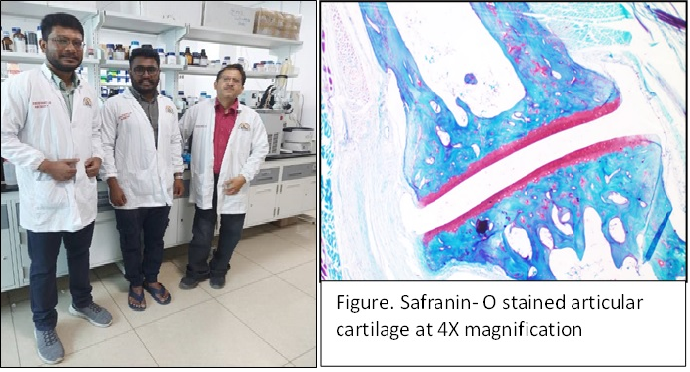Researchers from the Institute of Nano Science and Technology (INST), Mohali, have developed a potentially game-changing therapeutic nano-micelle drug delivery system that could revolutionize the treatment of rheumatoid arthritis (RA). The system combines anti-inflammatory drugs with a biocompatible nano-micelle, resulting in improved effectiveness at both alleviating pain and restoring cartilage integrity.
RA is a condition in which inflammation plays a significant role, making current treatments largely focused on providing temporary relief from pain rather than a permanent cure. Methotrexate (MTX) is considered the gold standard for treatment, but its severe side effects have led scientists to look for alternative strategies.
The research team, led by Dr Rehan Khan and Senior Research Fellow Akshay Vyawahare, explored the potential of combining the FDA-approved anti-inflammatory drug 9-aminoacridine (9AA) with caffeic acid (CA), a natural compound found in coffee and wine that has been shown to have anti-arthritic potential. They conjugated the drugs to a nano-micelle, an amphiphilic molecule that forms a spherical structure when immersed in water.
When administered, the nano-micelle loaded with the anti-inflammatory drug 9AA inhibited inflammatory mediators at the site of the disease by activating the NR4A1 gene, which regulates inflammatory mechanisms by inhibiting pro-inflammatory cytokines. The nano-micelle itself has therapeutic potential, but when combined with the anti-inflammatory drug, it demonstrated enhanced potential to cure rheumatoid arthritis in experimental settings by inhibiting joint damage and cartilage degradation. The new strategy also showed short-term (21 days) disease eradication and long-term (45 days) protection from disease reappearance.
This drug delivery system is simple, cost-effective, safe, and has significant translational potential. The nano-formulation has been tested on rats and published in ACS Nano, bringing hope for long-term relief for RA patients by suppressing the severity of the disease.





